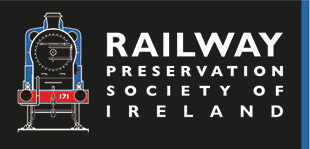To ensure that you pay the correct postage, please select the £ or € symbol below before proceeding:
- £ if you live in the United Kingdom.
- € if you live in the Republic of Ireland or in the Eurozone.
- If you live elsewhere, please email us with your order and postal address and do not place an order on the shop page.
Sales Terms & Conditions / Privacy
To allow for correct postage, please select Euro symbol below if ordering from outside the United Kingdom.
RPSI 2026 Calendar
The Society's calendar for 2026. £10.00
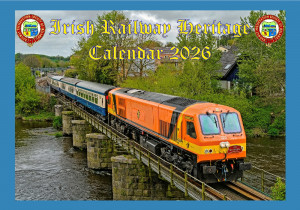
The RPSI 2026 calendar features photographs of steam and diesel locomotives in recent years. There are pictures of steam locomotives Nos. 4, 85 "Merlin", 131, 171 "Slieve Gullion" and 184.
No.4 is seen hauling a rake of coaches in CIE green livery travelling around Bray Head, while No.184 is seen running around a Santa Special in Killucan, appropriately in snow.
Two diesel locomotives appear in original CIE livery - A39 in silver and B142 in black and tan. There is a striking 1990s picture of four different classes of General Motors locomotives at the front of Connolly shed.
The final page contains a montage of various activities at Whitehead Railway Museum.
Irish Railway Rover Part 4
Michael McMahon £17.50
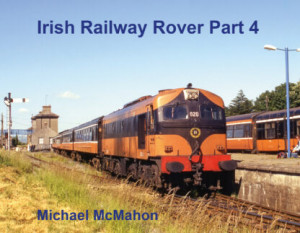
This is the fourth in a series drawn from a personal photographic memoir over thirty years of observation, starting in 1975 during what are now regarded as the ‘museum years’ of post steam Irish Railways.
This period of momentous change saw the traditional infrastructure of mechanical signalling, travelling post offices, steam heating, goods train services and 19th century buildings, etc., progressively give way to the utilitarian era. Notable pictures include: four trains at Limerick Junction, trains in the long disused Rosslare Harbour station, locomotive B121 in push-pull formation, Hunslet locomotives on Enterprise duties and a bird’s eye view of No.111 ‘Great Northern’ plus Enterprise train rounding the curve at Poyntzpass. The author had the rare privilege of all-Ireland footplate passes which led to an estimated 80,000 miles of footplate travel between 1982 and 1995. During his extensive wanderings Michael met and made friends with many railwaymen of all grades including permanent way gangs, workshop engineers, signalmen, train crews and management. This book is a tribute to those railwaymen and the railway of a bygone age.
Hardback, 25 x 18 cm, 95 colour photos, 80 pages.
IRISH RAILWAYS LINE BY LINE VOLUME 4, NORTHERN IRELAND RAILWAYS, 1968 to 2011
Jim Edgar £14.50
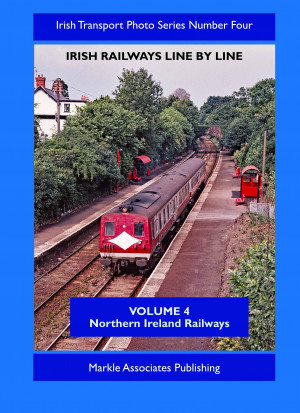
This book, the fourth volume of a series featuring the railways of the island of Ireland, covers Northern Ireland. It concentrates mainly on the period 1975 to 2000 when the network was undergoing great change during difficult times.
Although principally shot in diesel days, there are photos of NIR No.27 "Lough Erne", WT class No.5 and the Londonderry Port and Harbour Commissioners loco No.3. If you have not heard of the ‘Goraghwood Deviation’ then you must buy this book!
Softback, 25 x 18 cm, 133 colour photos, 22 B&W photos, 3 diagrams, 64 pages.
Rails Through Castlerock
Des Crockett £12.95
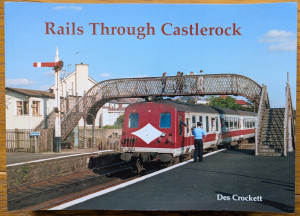
In 1972, the author’s family moved to Castlerock, Co. Londonderry, Northern Ireland. With lots of interesting old passenger trains coming through, the author started taking photographs of them in 1975 with his Kodak Instamatic, upgrading to a ‘decent camera’ in 1978.
Most of the photographs included in the book date from 1977, and the majority are of Castlerock station and the immediate area around the village, including Downhill, but there are also some photos of Magilligan and Bellarena.
One photograph, illustrating just how varied this book is compared to the description, shows signalman Kevin O’Brien releasing a pigeon that had just arrived by train from Londonderry in a cardboard box.
RPSI members will be pleased to see pictures of locomotives No.4 and No.171 on the Castlerock Extension of the Portrush Flyer - sadly not to be repeated with Castlerock loop now removed.
The era of freight trains on the line, hauled by locomotives or railcars, is well recorded.
The Listowel & Ballybunion Railway
Michael Foster £14.95

This book was first published in 1967 as a slim Oakwood edition by A.T. Newham, going through two print runs. In 1989, Oakwood issued a new edition by Michael Foster that included Newham’s original work. This edition, now reprinted with a new cover design, has been unavailable for many years.
The railway between Listowel and Ballybunion in County Kerry, Ireland, opened in 1888. Notably, it was a monorail built by the French Lartigue Construction Company. Until World War I, the railway remained financially viable thanks to local and tourist traffic. However, the war and subsequent turbulence severely affected its finances. When Ireland’s Free State government considered grouping railways into the Great Southern Railway, the Listowel & Ballybunion line was not included. By 1924, the line had ceased operation, and its last train had run.
Hardback, 21 x 15 cm, 62 B&W photos, 112 pages. 31 maps and diagrams.
Stamps
Sheet of RPSI postage stamps. £5.00
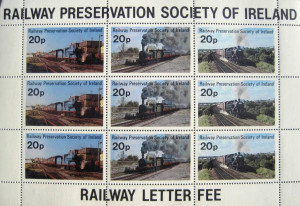
These sheets were produced during the 1970s for use by passengers on our trains. The idea was that passengers could buy an RPSI postcard plus stamp on the train, write the card and then post it in a post box in coach 861. After the trip, the cards were removed, had a proper Royal Mail stamp added and were posted in a regular post box.
Each sheet has 9 stamps, 3 each of the following taken from 35mm slides by Charles Friel:
- No.171 "Sieve Gullion" at Portrush, about to set off for Belfast and Whitehead with the "Portrush Flyer", 5/8/1975.
- No.186 passing Woodlawn, en route from Galway to Mullingar with the "Claddagh Railtour", 6/6/1978.
- No.4 crossing Bleach Green viaduct, en route from Belfast to Portrush with the "Portrush Flyer", 5/8/1977.
These were produced for use on RPSI trains only and are not valid for Royal Mail or An Post.
Souvenir Guidebook
Whitehead Railway Museum £5.00
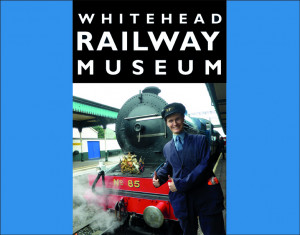
Whitehead Railway Museum is the home of the Railway Preservation Society of Ireland (RPSI). The Society has around 1,000 members and it depends on its volunteers to keep the wheels turning.
Whitehead Excursion station was opened in 1907 as a an overflow station to cope with the influx of day trippers from Belfast. It was taken over by the RPSI in the 1960s and many buildings have been added since. These now house the Society’s extensive collection if historic railway vehicles and memorabilia. Some of the locomotives and coaches are used by the RPSI on excursion trains all over the Irish railway system.
This guidebook is intended to complement a visit to the museum. It contains details of opening times and of how to obtain up to date information on Society activities.
Paperback, 90 colour and 38 b&w pictures, one map, 68 pages.
“It must surely be the best guide to any preserved railway centre of any sort, anywhere. It's just wonderful. You have included such a fabulous selection of pictures past and present, encompassing so many people as well as every aspect of the trains, etc. Hope it sells a million, it certainly deserves to.” - Michael H.C. Baker, Railway Author
Strabane's Railways Remembered
Jim McBride £15.00
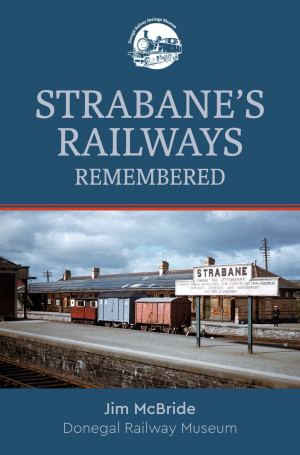
Irish Railways 100 Years
Michael H.C. Baker £16.99
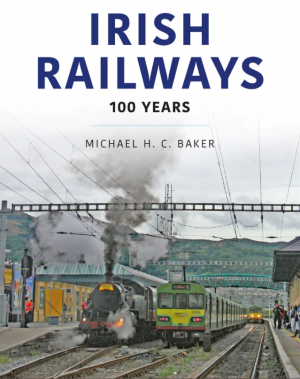
The 100 years since the Irish Free State was set up in 1923 has seen enormous change, both in society and on the railways. The creation of a border did the railways no good, prompting an upsurge in smuggling, and, with the exception of the few busy trunk lines from Dublin, the rise in motor vehicles threatened the future of the railways.
Post-1945, General Motors diesel-electric locomotives put paid to steam in the Republic, whilst Northern Ireland’s railway network has diminished and freight traffic is now all but extinct. Still, the belated realisation of the danger posed to the environment has produced forward-looking endeavours, with government encouragement. The electric Dublin Area Rapid Transport (DART) of the modern era has thus helped give back city streets to pedestrians, and continues to expand.
Michael, the master of the telephoto lens, is renowned for photographing scenes which many people hardly notice, until it is too late.
One striking picture shows the overgrown and abandoned approach to the closed Broadstone Station in Dublin in 1996. The next one shows the same scene in 2017, transformed by the arrival of the LUAS tram system.
RPSI members will be happy to see photographs of our trains in action, north and south, including No.4 in at Bray on the front cover.
Hardback, 24 x 17 cm, 106 colour photos, 77 B&W photos, 96 pages.
Steam's Last Challenge
Joe Cassells £15.00
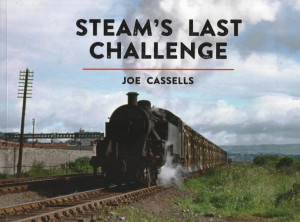
This lavishly illustrated new book, by lifelong RPSI member Joe Cassells, details the life and times of the Spoil Trains, and the men who worked them. Between 1966 and 1970 more than 4 million tons of quarry waste were moved from Magheramorne to the shores of Belfast Lough to form the foundations of the M2 motorway. And it was done by the last steam locomotives in these islands. Joe relates how the contract was originally drawn up, including the building of 70 dedicated wagons by Cravens of Sheffield. These incorporated a large opening side door for quick unloading at the Belfast end of each trip. At Magheramorne quarry, two extensive loading banks were built. Joe describes the heroic efforts of the maintenance staff, working in primitive conditions by present day standards, to keep the locomotives moving. The book is based on previously unpublished information, and sheds completely new light on many facets of the Spoil Train contract. After the contract ended, the RPSI preserved locomotive No.4 in running order. Since 1970, No.4 has hauled special trains all over the Irish railway system
Softback, 21 x 30 cm, 80 colour and 70 b&w photos, 5 maps, 98 pages.
The Ballycastle Railway Revisited
Jim McBride £12.00
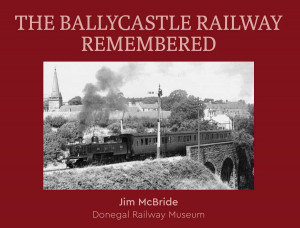
The 16 mile long, 3 foot wide narrow-gauge Ballycastle Railway operated from the mainline station at Ballymoney to Ballycastle between 1880 and 1950. It had the distinction of closing between April and August 1924, during which time it ceased to be a private company and it was taken over by the LMS NCC. The takeover ensured a variety of motive power and coaching stock. The author has collected a number of previously unpublished pictures and these capture the atmosphere of a rural, narrow gauge line which ran for 70 years.
Paperback, 18 x 24 cm, 3 colour and 67 b&w photos, 1 map, 64 pages.
Memories of Co. Limerick’s Railways
A.H. Vaughan £11.95

The author’s first love was trains. With British Rail, he started as a porter, later becoming a signalman, but after being made redundant for the third time in three years, he headed off to Ireland for fresh adventures with his new wife and his Rolleiflex Mod T camera. This book is the result and includes images taken by the author between 1974 and 1982 and four ‘must-haves’ from 1956 by Peter Barlow. RPSI members will be pleased to see a photo of locomotives No.171 and No.184 double-heading (remember that?) a railtour from Limerick, with wooden body coach 861 first in the train. Locations featured include Kilonan Junction, Limerick engine shed, Newcastle West, Rathkeale, Ballingreane Junction, Patrickswell, Foynes Junction, Colbert station yard, Limerick Check cabin, Lisnagry and Dromkeen signal box.
Paperback, 18 x 24 cm, 53 b&w photos, 1 map, 1 track plan, 50 pages.
Adventures of a Fighting Railway - The Belfast Central Railway Company 1864-1885
Robert Phipp £25.00

The Belfast Central Railway Company can probably claim to be Belfast's most important 'forgotten railway'. Forgotten, but certainly not lost, as most of the nearly four miles of railway it built in its short but turbulent life are still in use today, and indeed provide the link between the lines coming into Lanyon Place Station from the north and east and the line to Portadown and beyond. The Enterprise, which recently celebrated its 75th birthday, still leaves Belfast on the line the BCR built almost 150 years ago.
This book describes how the company came into being against the backdrop of Belfast in the early 1860s, when the town was just beginning to enter its golden phase of ship building, linen manufacture, engineering and ropeworks. It follows the fortunes of the company over the next twenty years as it eventually built and opened its line, and then battled for survival before succumbing to mounting debts, and being sold to the Great Northern Railway (Ireland) in 1885.
It's a story full of personalities, heroes and possible villains, a little bit of skullduggery, and above all, endless battles with other railway companies, the town council and the harbour commissioners, fought out in the press, Parliament, the courts and elsewhere. The epithet of a 'fighting railway' was never so well deserved
Paperback, 26 x 18 cm, 65 b&w photos, numerous maps and diagrams, 292 pages.
Lost Tramways Of Ireland: Belfast
Peter Waller £8.99
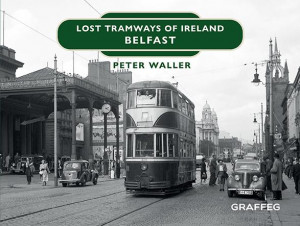
The first volume in the "Lost Tramways of Ireland" series features the history of the Belfast system, including its origins as a horse tramway in the 1870s, its conversion to electric traction in the early 20th century, its role in two World Wars, the conversion of the network to bus and trolleybus operation from the late 1940s and the system’s eventual demise in 1954.
Amongst the locations featured are Glengormley, Greencastle and Bloomfield as well as Great Victoria Street, York Road (prior to the attention of the Luftwaffe in 1941) and Queen’s Quay railway stations. Like so many assets that would be priceless today, the tramway system was discarded long before climate change became an issue.
Hardback, 15 x 20 cm, 40 b&w photos, 1 map, 64 pages.
Ireland’s Largest Industrial Railway: The Guinness System
Hugh Oram £10.00
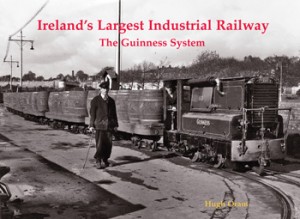
The Guinness brewery in Dublin expanded rapidly in the 1870s as the world couldn’t get enough of its ruby red gold (it might look black but that’s an illusion).
Horses and carts hauled hops, malt and casks around the site until 1873 when construction of a narrow gauge railway (tramway) began. This delightful little factory system operated for 100 years, ceasing work in 1975. Hugh Oram’s book is full of photos of (mainly) this and the day to day workings of the brewery. As well as the internal tramway, there was also a broad gauge link to Kingsbridge Station which closed in 1965 and is also featured.
Paperback, 18 x 24cm, 52 black and white photos, 50 pages
The Giant's Causeway Tramway
John McGuigan £15.95

Written by RPSI founding member, John McGuigan, and first published in 1964, this new edition comprises the original text but the book has been redesigned. New photographs have been added to bring the number of illustrations to 67 in total. In his preface the author recalls his childhood experiences of riding the toastracks on this narrow gauge railway from Bushmills to Portrush. A talk he was to give in 1948 caused him to talk to the tram crews and managers on the world’s first hydro-electric tramway. The book comprises eleven chapters covering the early days, operation, the First World War, the Second World War and after. Lack of maintenance meant that by 1949 the track was in very poor condition. This, combined with a growing overdraft, meant closure was inevitable and the assets were sold off piecemeal until 1952 when the company could be wound up. Eight appendices detailing locomotive, rolling stock, tickets and fares etc. tell more of the story.
Paperback, 21 x 15 cm, 67 b&w pictures, 6 maps, 1 diagram, 120 pages.
The County Donegal Remembered
Jim McBride £15.00
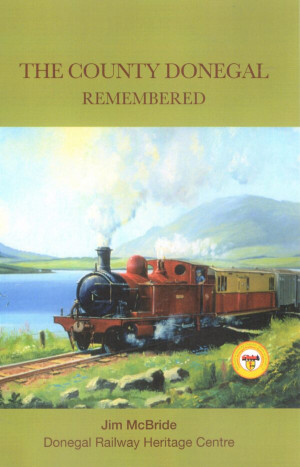
This book is published by the Donegal Railway Heritage Centre, Donegal Town.
The railway extended from Londonderry through Strabane, Stanorlar and Donegal Town to Killybegs, with branches to Letterkenny, Glenties and Ballyshannon. The vast majority of photographs in the book have not been published before and they show the wonderful and sometimes wild scenery through which the railway ran. The County Donegal Railways were pioneers in the introduction of diesel railcars, and steam traction was retained for freight and excursion trains until the system closed on 31st December 1959. The book includes a reprint of an article on the County Donegal Railways written by Sam Carse in 1951. The author has been involved with railway heritage and preservation for decades, and is the Irish Editor of the “Disused Stations” website.
Softback, 24 x 15 cm, 50 colour and 200 b&w photos, 1 map, 144 pages.
The Lough Swilly Remembered
Jim McBride £11.00
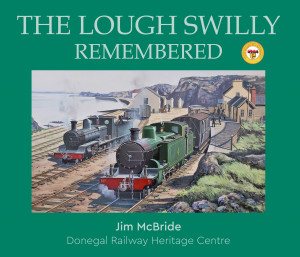
This book looks at the last twenty years of the Londonderry and Lough Swilly Railway from the early 1930s up to the closure of the railway itself in 1953. We travel on the Swilly from Derry to Burtonport, and also visit Letterkenny and Buncrana.
The story is told through many historic photos from the past. Over 50 unpublished photos have been selected of this forgotten Irish railway, which had some unique and distinctive features. The company’s terminus at Graving Dock in Derry looked more like a goods shed! There are superb pictures of the magnificent 4-8-0 locomotive No.12 in action. No.12 was one of only two tender locomotives to run on Irish narrow gauge railways - if only one had been preserved. It is clear from the photos that all the Lough Swilly locomotives were kept in excellent external condition right up until closure.
Softback, 18 x 24 cm, 60 b&w photos, 1 map, 64 pages.
Rails Through Tipperary
Jonathan Beaumont and Barry Carse £18.00
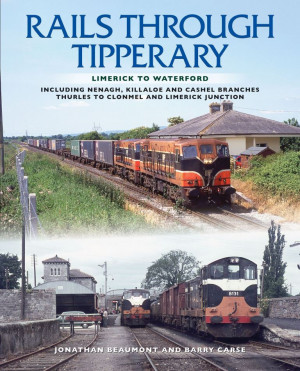
This book is a scenic photographic odyssey through the ‘Golden Vale’ of County Tipperary covering the route from Limerick to Waterford along with the branches and section of the Dublin–Cork main line that intersects them. There are photos of the Limerick to Ballybrophy line via Nenagh, of the Killaloe and Cashel Branches, and of the Thurles to Clonmel line. Limerick Junction with its unique layout is given detailed treatment as is Thurles sugar beet factory. The pictures are complemented by a selection of timetable extracts and gradient profiles. Drawing primarily from the photos of Barry Carse, the book illustrates these lines from 1960 onwards, in an era of locomotive hauled trains and of freight services on all lines.
Softback, 26 x 21 cm, 180 colour and 6 b&w photos, 1 map, 5 track plans, 160 pages.
Rails Through Connemara
Jonathan Beaumont £15.95

The book begins with an account of Connemara, in the west of Ireland, and the various schemes put forward to link its two main settlements, Galway and Clifden. The line was finally built by the Midland Great Western Railway in 1895 and the MGWR operated it until 1925 when the government merged all railways operating only in Irish Free State into Great Southern Railways. The line closed in 1935. The book has eleven chapters including Train Services, Locomotives and Rolling Stock and Road Services . Appendices include the Shantalla Siding, Tourism and the Recess Hotel, The Ulster & Connaught Light Railway and The Marconi Railway, Clifden. Anyone who has read Jonathan’s previous book on the Achill line will know to expect an outstandingly well researched and readable publication.
Softback, 21 x 15 cm, 2 colour and 101 b&w photos, 19 maps, 22 drawings, 192 pages
Rails to Achill – a West of Ireland Branch Line
Jonathan Beaumont £10.95

If you travel from Westport in the west of Ireland from Westport through Newport and Mallaranny to Achill Sound today, here and there you will see overgrown sections of railway embankment, bridges and a couple of tunnels, as well as the magnificent stone viaduct across the river in Newport. These are the surviving remnants of the old Achill line (now a popular greenway) - a branch line built at the close of the 19th century to help develop the area and link it with the outside world.
It proved to be a great social and economic asset to this area of County Mayo, but traffic never consistently reached the levels originally anticipated, and the last train ran in the autumn of 1937 - a mere 42 years after the line had opened. Since then, trains have operated from Dublin just as far as Westport, which is now the railhead for the area. This is the story of the ‘Achill Railway’ - described by travellers at the turn of the 20th century as ‘one of the most scenic railway journeys in these Islands’. The book also includes the history of the Westport Quay line and of two short lived mineral lines on Achill Island.
Paperback, 21 x 15 cm, 130 b&w photos, 25 drawings, 160 pages.
Rails Through Connemara / Raills To Achill
Jonathan Beaumont £24.90
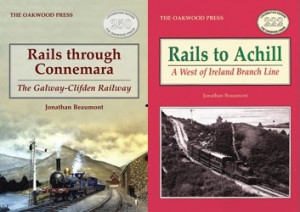
Order both books together for a discount - see individual book entries for full information.
Great Northern Railway Of Ireland Road Motor Services 1925-1958
Sam Simpson £21.00
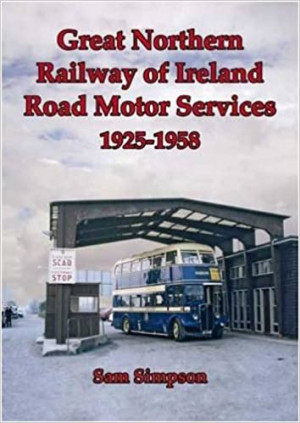
Any reader who thinks that this book may not contain much of interest to the railway enthusiast should think again, as the fortunes of the GNR(I) road motor services were inextricably linked to the those of the parent railway company. Sam Simpson describes in detail the effects on the GNR(I) and on its employees of partition in Ireland, the 1933 strike, competition with private companies, World War 2 (known as the ‘Emergency’ in the Free State), and the growth of private car ownership in the 1950s. There is a chapter on the company’s innovative railbuses, built at the GNR(I) works in Dundalk, where road buses and lorries were also built. The comprehensive appendices give details of the company’s fleets of buses, lorries and other vehicles, bus companies bought by the GNR(I), and the routes of all road services. The author’s extensive research has resulted in a book packed with information and it is a real eye opener to those who thought that the GNR(I) just ran trains.
Hardback, 30 x 21 cm, 47 colour & 134 b&w photos, 224 pages.
Smoke Amidst the Drumlins - The Cavan and Leitrim Railway in the 1950s
Anthony Burges £6.00
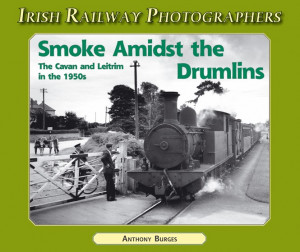
The front cover picture of this book captures the atmosphere of the narrow (three foot) gauge Cavan and Leitrim Railway – a train pulls away from Mohill station and over a level crossing. Behind a closed gate wait a postman with bicycle and a farmer with his donkey and cart. The railway was steam hauled for its lifetime and, in later years, it acquired locomotives from the Cork, Blackrock and Passage and the Tralee and Dingle Railways. Coal traffic from Arigna mine (one of the few in Ireland) sustained the railway until closure in 1959.
Paperback, 20 x 24 cm, 61 b&w pictures, 1 map, 64 pages.
Horseshoes and Trolley Poles - Fintona and Howth trams in the 1950s
Anthony Burges £6.00
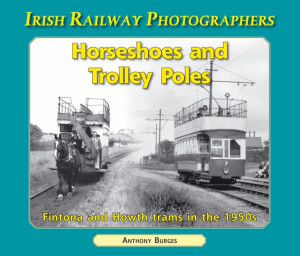
If they had survived, they would make wonderful tourist attractions today. The Great Northern Railway (Ireland) operated both the horse drawn Fintona Tram (closed 1957) and the electric Hill of Howth Tram (closed 1959). This book is Anthony Burges’s pictorial record of both systems in everyday use when public transport was still popular due to low car ownership. Anthony’s pictures capture the atmosphere of the 1950s. Do you remember the days when suitcases had no wheels?
Paperback, 20 x 24 cm, 56 b&w pictures, 2 maps, 63 pages.
Horseshoes and Trolley Poles / Smoke Amidst the Drumlins
Anthony Burges £10.00

Horseshoes and Trolley Poles - Fintona and Howth trams in the 1950s
Smoke Amidst the Drumlins - The Cavan and Leitrim Railway in the 1950s
Order both books together - see individual book entries for full information.
The Bessbrook And Newry Tramway
A.T. Newham £10.95

First published in 1979 and unavailable for decades this little book has been reformatted as a landscape book. This new format does justice to the excellent photographs. The Bessbrook & Newry Tramway was a narrow gauge line operated on the hydro-electric principle and built to transport coal and flax from the Newry quays to the Bessbrook Spinning Mills, finished goods in the reverse direction and mill workers. It opened in October 1885 and closed in January 1948. This little book is packed with information including the background to construction and opening, equipment, description of the line, operation (and mishaps), rolling stock, tickets and closure. Four maps and gradient profiles are also included. The back cover features a photograph of tramcar No.6, which is currently under restoration at Whitehead.
Paperback, 17 x 24 cm, 35 b&w photos, 52 pages
Five Foot Three No.70
The Society's annual magazine - March 2025. £5.00
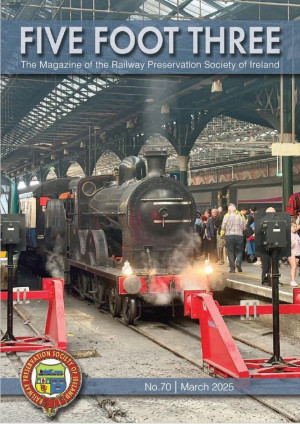
The latest issue of the Society's magazine, detailing the events of 2024. Includes reports on all Society activities.
Paperback, A5, 48 pages with colour photographs.
Five Foot Three No.69
The Society's annual magazine - March 2024. £5.00
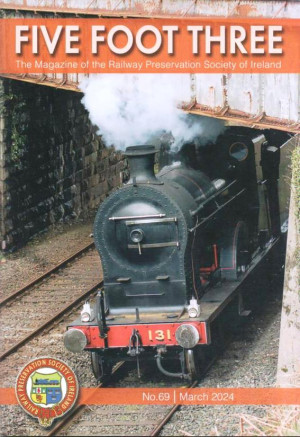
The latest issue of the Society's magazine, detailing the events of 2023. Includes reports on all Society activities.
Paperback, A5, 80 pages with colour photographs.
Five Foot Three No.68
The Society's annual magazine - March 2023. £5.00
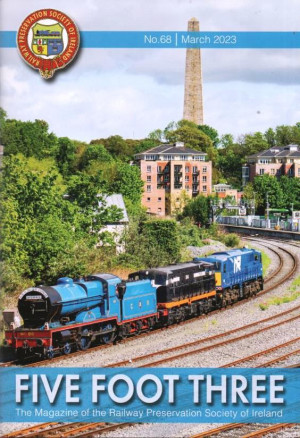
The latest issue of the Society's magazine, detailing the events of 2022. Includes reports on all Society activities.
Paperback, A5, 64 pages with colour photographs.
Parting Shot – Railway Photographs from 1964 to 1973
Norman Johnston £8.00
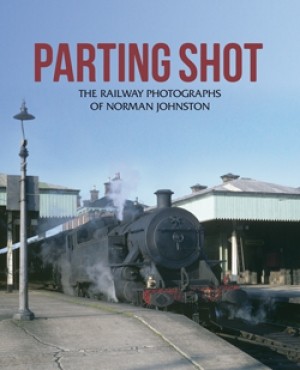
Norman Johnston is widely regarded as one of Ireland’s foremost railway historians, who has meticulously photographed and recorded the changing world of Irish railways from the early 1960s.
This book draws from his remarkable collection and showcases some of what Norman regarded as the best, most interesting and significant images that he took during the pivotal period between 1964 and 1973. The pictures are presented in roughly chronological order and include some CIÉ as well as UTA and NIR. All are accompanied by extended captions filled with detail, anecdotes and personal reflection.
Norman began writing the book during the last two months of his life, completing the manuscript just seven days before his death on 31 August 2014. His choice of title reflects the fact that he knew that it would be his last book.
The book is published by Colourpoint Books, the company which Norman founded in conjunction with his wife, Sheila, and which contributed so much to our knowledge of Irish railways in terms of books published. Norman’s sons, Malcolm and Wesley, now run the business and continue to publish books of railway and transport interest.
Paperback, 26 x 21 cm, 198 colour & 37 b&w photos, 160 pages.
The County Donegal Railways
E.M. Patterson (Revised edition with additional material by J. Begley & S. Flanders) £18.00
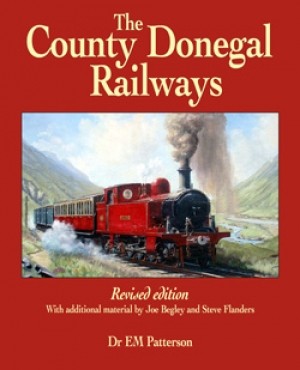
This is a new edition of E.M. Patterson’s first volume on the history of the narrow-gauge railways of North-West Ireland, originally published in 1962. The County Donegal Railways had a route of 124 miles, five termini and three junction stations. For the most part they traversed hilly and thinly-populated country and for two generations they were a busy and efficient operation. This edition adds a valuable chapter of interviews and memories of some of the surviving workers and others who had contact with the railway. It also includes a chapter on the County Donegal Railway today as, over 50 years after closure, much can still be seen of the former network. Some additional Glover drawings of locomotive, carriage and wagon stock are included.
Paperback, 26 x 21 cm, 34 colour & 55 b&w photos, 32 maps and diagrams, 192 pages
Adult
Society Subscription (Adult) £30.00

Please select the Euro currency option if not resident in the United Kingdom.
If you are joining for the first time please return an application form for our records.
PLEASE NOTE
By submitting this form I consent to the RPSI contacting me by post and/or email.
The standard postage rate is applied to online subscriptions.
Senior
Society Subscription (Over 65) £25.00
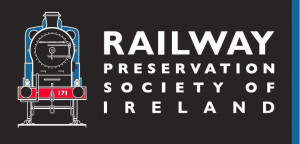
Please select the Euro currency option if not resident in the United Kingdom.
If you are joining for the first time please return an application form for our records.
PLEASE NOTE
By submitting this form I consent to the RPSI contacting me by post and/or email.
The standard postage rate is applied to online subscriptions.
Junior
Society Subscription (Under 18) £18.00
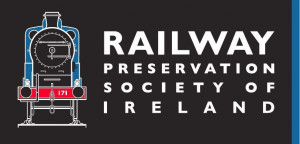
Please select the Euro currency option if not resident in the United Kingdom.
If you are joining for the first time please return an application form for our records.
PLEASE NOTE
By submitting this form I consent to the RPSI contacting me by post and/or email.
The standard postage rate is applied to online subscriptions.
